 Sierra Nevada granite this time. Back next week.
Sierra Nevada granite this time. Back next week.
Thursday, July 28, 2005
Courage and conversation go a long way

Every once in a long while, one hears a story that helps restore one's faith that reason and courage might sometimes prevail over ignorance and fear. This is such a story.
In Pinellas Park, Florida, Mike Allen decided to make a political statement, according to the St. Petersburg Times:
Clearly this is once ornery, aggrieved bigoted nutcase.Abdeslam Rahmouni was horrified and offended at the sight of the toilet in the yard on 62nd Avenue. It was not the toilet per se. It was the sign in red letters on a white background: "Koran flush 1 p.m."
. . .
Allen's original thought was to use the toilet as a Memorial Day display. He would drop pictures of Osama bin Laden and pages from the Koran one by one into the toilet. The act, he said, was a way to honor those who died in the Sept. 11 terrorist attacks and in Iraq since the war began. It was also retribution, he said, for what Allen sees as a failure of Muslim clerics to object to the terrorism of Islamic extremists.
. . .
Allen's fight is not only with Islamic terrorists, it's also with Pinellas Park's code enforcement department, which cited him for having the toilet in his yard before the sign was put on it. . . .Allen, who received a $183 ticket for the toilet, said code enforcement has "tortured and harassed (me) even more than the people over in Gitmo" for speaking out once in a while.
Or maybe the situation is not so clear at all.
Council on American-Islamic Relations Central Florida Director Ahmed Bedier learned of complaints about the display. He went to the home to take a picture. When he noticed that the owner was home, he knocked on the door. And he talked with Mike Allen about his display.
Bedier happened to have his laptop computer with him. He showed Allen some of the Muslim condemnations of terrorism and CAIR's "Not in the Name of Islam" public service announcement. After about an hour of discussion, the homeowner offered to take down the toilet display.

Wednesday, July 27, 2005
Recalling the Obvious

With Blair and Bush bleating that terror attacks by Islamic nutcases have nothing to do with anything our governments may have done, this bears repeating:
From a poem written July 8, 2005 by Mike Rosen, a writer of children's stories, a Jewish socialist from east London. Source: Eamonn McCann's columnin the Belfast Telegraph (where they know something about bombings.)If you go into other people's countries
and bomb them
they will bomb you.
You can call them what you like
You can tell us that our cause is noble
You can tell us that they're evil and we are good
But the rule remains:
If you go into other people's countries
and bomb them
they will bomb you.
You can tell us that you've flushed out the troublemakers
You can tell us that you've neutralised the flashpoints
You can tell us that you've sown the seeds of the future
But the rule remains:
If you go into other people's countries
and bomb them
they will bomb you.
The cause is plain. The cure is simple. Britain and America should get out of Iraq.
Tuesday, July 26, 2005
Hot new item

Found this on a number of British blogs. For more, you might want to start with Nosemonkey.
In particular, the pack might have been saved five tourists in New York yesterday, as reported by the NY Times.
Oh sure, I feel SO much safer.According to the Police Department's chief spokesman, Paul J. Browne, a Gray Line supervisor approached a police captain who was nearby and told him five suspicious-looking men were on board with backpacks.
Mr. Browne said the supervisor was also suspicious because all five men had bought their tickets in advance.
The police responded by cordoning off the block to traffic for 90 minutes, ordering all 60 passengers off the bus, searching their belongings and then searching the passengers themselves.
After the supervisor pointed out the five men, the police handcuffed them. The men were handcuffed for 10 minutes while the police searched them and looked for backpacks that the police ultimately determined the men did not have.
The police said later that the men did not pose any threat. The five, all British citizens, were identified yesterday as Baljh Sahota, Chauinder Gill, Jackjit Singh, Askhad Addokou and Johal-Singtt Cashant.
UPDATE: This incident has drawn an apology from Mayor Bloomberg and some recriminations between Gray Line and the NYPD. Today the Times published a picture showing tourists led off the bus with hands in the ari:
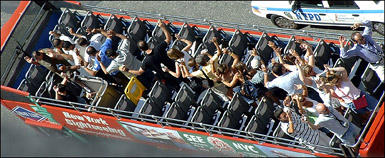 Welcome to New York!
Welcome to New York!
Monday, July 25, 2005
The Morning Retch: Crusade Incitement

Well, this time nobody's gotten blown up or shot, but a pastor in Florida is determined to see what he can stir up.
Actually it is pretty hard to find any religous tradition that approves of encouraging hatred, but that has never inhibited some of the faithful.JACKSONVILLE, FL -- The sign in front of the First Conservative Baptist Church in Mandarin has an eye-catching -- and some say inflammatory --message. "Islam is evil and believes in murder," it reads. "Jesus teaches peace."
Pastor Gene Youngblood, the author of that message, declined our request for an interview. Instead he directed us to a passage in the Qu'ran, the Muslim holy book - Surah 9-29.
But "fight against those who believe not in Allah" is part of a passage that is too easily taken out of context, says Parvez Ahmed, Chairman of the Council on American-Islamic Relations. Ahmed says the line refers to an ancient war between Muslims and non-Muslims and that Islamic scholars do not interpret it literally. "People of all religions have taken passages out of context, whether they be Jew, Christian, or Muslim, and used them to justify the unjustifiable," Ahmed said.

Sunday, July 24, 2005
Foundations roll over, act as terrorism police

Not only are foundations self-interested slime, they are also habitually "risk averse" (that means cowardly) if they suspect they might attract negative government attention.
So it is not surprising that:
The New York Times reported last year that the ACLU had rejected grants from the Ford and Rockefeller foundations rather than examine themselves for promotion of terrorism. The exact language of Ford's grant letter was: "By signing this grant letter, you agree that your organization will not promote or engage in violence, terrorism, bigotry or the destruction of any state, nor will it make subgrants to any entity that engages in these activities." The ACLU responded in effect (my paraphrase): "Huh? What's that mean? You want us to intuit what it means?"United Way of Allegheny County is requiring its more than 3,000 partner agencies to sign a federal anti-terrorism form in order to receive monies during its upcoming annual campaign, a change resulting from the USA Patriot Act. The "USA Patriot Act Anti-terrorism Certification Form" requires nonprofit organizations to certify that they don't knowingly employ people or support groups whose names appear on terrorist watch lists compiled by the government.
. . .
"What does it mean to be a good citizen anymore?" [Peggy] Outon, [founder and director of the Bayer Center for Nonprofit Management at Robert Morris University,] said. "For a nonprofit to have to testify that 'I'm a patriot' -- my gosh, we get up in the morning to try to make the community stronger.
"It's just interesting we live in a society now where we have to testify to patriotism." Pittsburgh Post Gazette
What the United Way in Pittsburgh has chosen to do sounds as if it is letting vague government requirements make it a full partner in spreading fear among small non-governmental organizations. But is it the United Way's job to police unknown intentions and vague suspicions?
Teresa Odendahl, formerly director of the National Network of Grantmakers (that's the liberal funder caucus) has researched the implications of this kind of thing and reported about it here. [ Warning: pdf.] Her findings are depressing if predictable. Confronted first with a Presidential Executive Order and then ambiguous Treasury Guidelines that enlisted foundations in "the war on terror," the foundations complain, point out the futility of the government's demands, and roll over.
And no wonder the process is expensive:We observed a kind of cognitive dissonance among foundations concerning the Treasury Guidelines. Grantmakers are eager to point out that their giving priorities and processes have not changed as a result of new security legislation . . . .Yet in the same breath those interviewed mention discussions with legal counsel and rattle off the lists they check and other ways they have adapted to this new environment. In fact, all of the foundations we contacted check lists. Some do it daily, others weekly or monthly. In implementing the new list checking systems, the price tag varies from being negligible for some grantmakers to as high as $500,000 for one or two other notable foundations.
Big brother is alive and well and masquerading as a funder of charitable organizations!The Vice President of a major foundation described its comprehensive list checking procedures. When a conversation starts between a program manager and a potential grantee, the appropriate program director is told, and members of the organization are checked against the lists. Then when the grant is made, the organization is checked again, and at the fund disbursement step, the organization and principals checked yet a third time. Additionally, all active grantees are checked every day.
Naturally other parasites want a piece of this new market. There are commercial data base outfits that contract to check "watch lists" for the foundations. And
Funders did want Odendahl to understand that they knew all this certifying grantees as terrorism-free was not making anyone safer.Universities are also getting into the game. In recent weeks, the government has released the prototype for new search technology “to sniff out terrorists.” Agencies including the Federal Aviation Administration are investing in a new search engine, or “text analysis system,” being developed at the University of Buffalo to “mine a corpus of documents for associated ideas or connections – connections between two unrelated concepts, for example, that would otherwise go unseen or would take countless hours of investigative work to discover.” It’s a kind of government google, specifically funded for anti-terrorism efforts. . .
So what does all this mean to ordinary small scale nonprofit organizations? It seems to mean foundations are becoming even more careful than they always have been to limit their grants to known, large, conventional charitable entities. Innovative and oppositional groups (think your local Peace Education Project, whether "peace" refers to gang violence or the US invasion of Iraq) can forget it.Many compliance officers at foundations scoff at the practice. “What does certification do? Wouldn’t a terrorist just sign the letter?” One Program Officer shared with us her frustration, noting that certification language is “useless and embarrassing.” Yet a majority of the grant letters we have looked at now require anti-terrorism certification. . . .
‘Compliance’ with new regulations has come to mean a tacit agreement among grantmakers and grantees to ignore the inane and untenable and adopt only those regulations that are seen as most vital in protecting organizations against legal and political liability
Saturday, July 23, 2005
Death on the Fourth of July
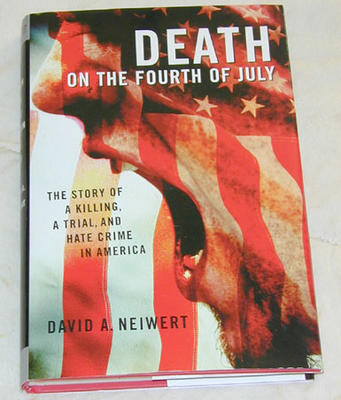
I just finished reading this study by David Neiwert, author of the invaluable blog Orcinus.
Death is really two books. One theme is an extremely well researched, exhaustively argued, explication of bias crimes legislation, the laws that enable courts to name and give enhanced sentences when they find that perpetrators were motivated by bigotry. Neiwert covers all the bases here. He describes the origin of the effort to criminalize bigotry with anti-lynching laws in the 1920s and 30s(we never got a federal law!) and continues up through modern right wing insistence that protecting gays from bias crimes would create "special rights."
If I were a neutral Martian I'd be really fascinated by all of this, but I'm not (either a neutral Martian or fascinated.) The creeps who don't want hate crimes laws haven't changed much since they were repressing uppity Negroes in the old South after the Civil War -- they enjoy being top dogs; they don't want to share; and they make up any intellectually specious nonsense (all pretty much cut from the same legal-rights-for-moral-white-folks cloth) that enables them to hang on to superior status.
I was much more interested in Neiwert's other narrative describing the sequence of events which left a Confederate flag waving white man dead and an Asian immigrant on trial for manslaughter in a small Washington state beach resort town. As a pretty visible dyke, I've known what it is to be afraid of the locals in slightly seedy vacation spots where bored local kids sometimes get their kicks by harassing the "wrong kind" of tourists. That kind of scene is trouble waiting to happen. What was unusual in this case was that, not only did someone end up dead, but, almost accidentally, it was the bully who was killed while his intended victim walked away (though certainly not unscathed.)
As is usually the case in this kind of crime, there was lots of warning. The same small crowd of unruly local white boys had harassed Filipinos and an African American earlier in the day before they ended up late at night, drinking heavily, outside the only store open in town. There they met three hapless Asians and picked a fight, not knowing that in fear for his life, one of the potential victims had picked up a couple of paring knives for self defense. Local police, totally untrained in dealing with hate crimes, charged the knife wielder, ignoring the racial harassment and threats; to their great credit, a local white jury hung 11-1 against convicting and charges were dropped.
Neiwert tells a good story, fairly, and with nuance. In the present political climate, it is unlikely that governments will fund training for small police departments to recognize and deal with bias crimes, as he suggests. But the book is a useful read as we confront a climate in which security fears will almost certainly encourage a range of hate crimes directed at perceived enemies, whether Muslim, or brown, or Black or queer.
Friday, July 22, 2005
Shoot to kill

The witness' account is vivid.
"I got into the ticket hall. I was approached by a policeman and London underground staff asked me if I needed counselling. I was basically saying, 'I've just seen a man shot dead'," Mark Whitby told News 24's Philip Hayton just minutes after the incident at Stockwell tube station in south London.
"As he got on to the train I looked at his face. He looked sort of left and right, but he basically looked like a cornered rabbit, a cornered fox. He looked absolutely petrified and then as I say he sort of tripped, but they were hotly pursuing him.
"They couldn't have been no more than two or three feet behind him at this time and he half tripped and was half pushed to the floor and the policeman nearest to me had a black automatic pistol in his left hand. He held it down to the guy and unloaded five shots into him."
The dead guy may have been about to blow up the Tube. The guy may have been a scared South Asian fare jumper. Only time will tell. We don't know and won't for awhile.
But today's developments pushed me to think about what it might mean here in the US, if, as the BBC explains, "shoot to kill" becomes the norm in trying to stop terrorist bombings.
In the US, as shown in the National Rifle Association map above, all but 4 states allow some carrying of concealed weapons by permitted private citizens. The NRA touts these hidden guns as useful for self-defense.
Perhaps -- but how long will it be, if US police adopt the "shoot to kill the terrorist" policy, before some nutcase on public transportation decides the turbaned gentleman across the way looked at him suspiciously and blows the wog away? Given our resident social pathologies, testosterone poisoning and racism, it is going to happen. Remember Bernhard Goetz.
I do take some small encouragement from perusing the map: the states where the NRA considers the "right to carry" too restricted include most of those with developed public transportation.
UPDATE: Oh shit, Scotland Yard says the shooting was a mistake, a trajedy.
"We believe we now know the identity of the man shot at Stockwell Underground station by police on Friday 22nd July 2005, although he is still subject to formal identification.
"We are now satisfied that he was not connected with the incidents of Thursday 21st July 2005.
"For somebody to lose their life in such circumstances is a tragedy and one that the Metropolitan Police Service regrets."
There's a part of me that sympathizes with the cops; they have a scary job to do. But someone is dead, gone forever.
End of benefit of the doubt
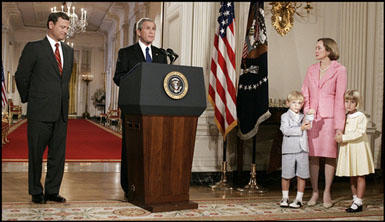
It has been hard for me to work up much energy for denouncing Judge John G. Roberts, President Bush's Supreme Court nominee. After all, I knew I was never going to like anyone Bush would be willing to nominate, so it is going to take finding something pretty awful to get me into a proper sweat over this guy.
Actually, I'm almost grateful that Bush didn't go the talking dog route, offering a fascist woman and/or person of color. There's no pleasure in observing the contortions of the viciously ambitious. Or maybe simply crazy.
But the picture above catches what immediately rankled about the guy -- he, and his family, look just like all the smug upper class twits I left behind by choosing to go to college at Berkeley in the sixties instead of one of the Seven Sister colleges.
As Robin Givhan writes in today's Washington Post:
Okay, so they flunk looking fashionable or even passably contemporary. Is that a crime? Certainly someone like me who once gleefully accepted the label "frumpy" can't go there.It has been a long time since so much syrupy nostalgia has been in evidence at the White House. But Tuesday night, when President Bush announced his choice for the next associate justice of the Supreme Court, it was hard not to marvel at the 1950s-style tableau vivant that was John Roberts and his family.
But today, buried in the last paragraph of a New York Times roundup of Robert's judicial opinions, came this:
If it is good law to enforce what is unjust, law loses any claim to morality; without a moral claim on society, law is simply superior force. This is a view that can only be held by someone smugly confident that he has the guns and will continue to wield them indefinitely -- a 1950s US upper class white boy perhaps?. . . he was impatient that same year with Thomas Penfield Jackson, a trial judge who ignored sentencing guidelines in determining that Darin M. Tucker deserved probation rather than imprisonment for possessing cocaine. Judge Jackson declared that he was "not going to be an instrument of injustice."
That was unacceptable, Judge Roberts wrote. "To the extent the district court based the departure on its belief that the sentence was unjust," he wrote, "it relied on a factor that is clearly impermissible under the guidelines."
Wednesday, July 20, 2005
Convenience or electronic handcuffs
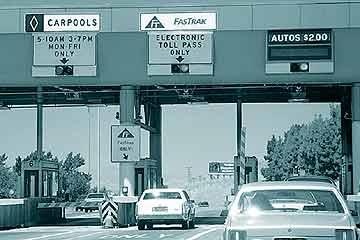
As far back as 1994, when working on the campaign against California's anti-immigrant Proposition 187, I was surprised to learn that all of the younger people on the campaign believed that we would someday all have to carry national identity cards. Nor were they very worried about it.
This article deftly summarizes why it didn't occur to them to worry. According to Christopher Caldwell, we live in a society in which all too often we have "the option of trading a bit of privacy for a load of convenience." We enjoy EZ Pass (or Fastrak) to pay our bridge tolls. We use the Lo-Jack to trace our stolen cars. We're quite ready to plant a minature chip in pets so they don't wander off; can chip implanting at human births be far behind?
In more and more walks of life, if what you want to do is not trackable, you can't do it. ... It now seems quaint that after the Oklahoma City bombing in 1995, Congress argued over whether ''taggants'' should be required in explosives to make them traceable. Today everything is traceable. Altered plant DNA is embedded in textiles to identify them as American. ... The information collected about consumers is the most sophisticated and confusing taggant of all. It is a marvelous tool, a real timesaver and a kind of electronic bracelet that turns the entire world into a place where we are living under house arrest.
When the technical means exist to control human beings, they will be used. Railing against them won't make them go away. We made them; we must also to create the social systems to control our own inventions.
Tuesday, July 19, 2005
Free speech demands courage from us

An interesting article by Tim Wu in Slate seeks to dispel any easy confidence that the internet will not become a tool of thought control. He discusses Chinese rulers' efforts to partition off a portion of the net, exploiting its power to promote Chinese economic activity and technical proficiency, but keeping Chinese net users quarantined from political ideas that would challenge their power.
His most important point is that China's version of the Internet will feel free to users despite being quite a different place than current US users experience. He catalogues how this will happen:
- search engines will return many answers, but invisibly exclude some as well;
- blogs and chat rooms will encourage certain kinds of officially endorsed enthusiasms that drown out other kinds of thinking. Wu cites the campaign rousing Chinese against the US bombing of the Chinese embassy in Belgrade in 1999 as an example. Here's another sample of this Chinese practice.;
- the physical net backbone will employ partially incompatible protocols from the rest of the international net;
- only forms of wireless networking that require every user disclose their true identity will be allowed;
- and through these means, the Chinese implementation of the net will not completely shut out ideas, but will make some thinking difficult to express and rarely encountered.
I have to ask myself -- is this dystopian future really so far from our experience of the contemporary US media environment, including, but not limited to the internet?
Certainly obsessive excitement about trivia is the defining characteristic of our mainstream media -- Michael Jackson, Scott Peterson, and runaway brides rule. Progressive political blogs do it too; there were recent moments when Ohio voting conspiracy theories or Jeff Gannon seemed to drive out most other content. Sure, there is other information out there, but it isn't going to get even roughly equivalent airtime. Jeanne d'Arc at Body and Soul launched a great discussion of this by pointing out: "the real game is taking control of the conversation."
However focusing on the particular means by which censors control conversation misses the deeper mechanism by which this is achieved or perhaps by which we are persuaded to impose it upon ourselves. Here in the US, our entire economic system teaches us to find our niche interests and preferred products and to consume within our niches. Marketing depends on developing and cultivating our attachments to various self-images, styles, and their accompanying products. We are very carefully taught to self-segregate from interaction or even information that challenges our carefully cultivated "individuality."
We feel we are choosing freedom.
But despite that feeling, we also make pretty good herd animals, following those who ratify our "choices" -- think Fox news consumers who love GWB because Saddam Hussein attacked the US on 9/11 -- or think anti-capitalists who protest the G-8 by fighting the police in San Francisco because "all revolutions included street fighting." Preserving our niches can lead us up some pretty wacky byways, something the structure of the internet facilitates.
Free speech is not just about having access to a megaphone, though having a bigger one amplifies anything said. Free speech that matters requires something much harder to cultivate: an inquiring mind that explores the unfamiliar. The prerequisite for such a mind is courage.
Guess if I want free speech on the internet or elsewhere, I had better follow my own prescription and go visit a lot of unfamiliar places and engage with people I don't know.
Monday, July 18, 2005
Racism watch: "Dirty Mexico" for sale
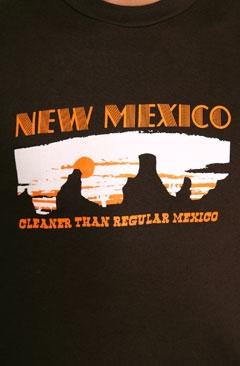
This charming item appears on a T-shirt for sale at Urban Outfitters, the oh-so-hip clothing retailer.
For an insight on the "dirty Mexican" stereotype at work, read this column by Douglas Bower. Guess what hotels have bedbugs now. . .
And you can help break the link from Urban Outfitters above by contacting the chain store to express your feelings and by signing the petition at Blue Latinos here.
Sunday, July 17, 2005
The Morning Retch: Don't speak Spanish to a riot cop

This one really is stranger than fiction. An 11 year old girl was playing with younger siblings; neighborhood boys tease the children; she throws a rock at one, hits him, he bleeds; she tries to apologize -- and the Fresno police jail her and charge her with felony assault.
Oh yes, Maribel Cuevas and her family have trouble speakingn English. Excerpts from the story:
"She's 11 ... they're treating her like she's a violent parole offender," said Richard Beshwate, Jr., Maribel's lawyer. ...
Officers denied that their response was influenced by the setting — a low-income, largely minority neighborhood — or language difficulties — Maribel's family speaks limited English, and the responding [officers] don't speak Spanish. ...
Guadalupe Cuevas couldn't communicate with the officers, because she doesn't speak English, and was pushed away when she tried to reach her daughter. Maribel was crying, the police report said, but Officer Christopher Green, who handcuffed her, wrote, "We were able to get Cuevas into the back of the patrol vehicle." ...The police report said Green read Maribel her Miranda rights twice, in English. The report also lists the girl's emotional state as "apologetic" and "hysterical."
Guadalupe Cuevas said didn't understand what was happening. "The officer was just saying, 'I don't care, I don't care,'" Guadalupe Cuevas said in Spanish. "He told my nephew he didn't speak his kind of English."
Fortunately the Cuevas family belongs to a church who got them a lawyer. She'll still be traumatized, but we can hope Maribel will go through life without a criminal record.
Likes and dislikes

Foreign Policy magazine is running a tortured piece, In Search of Pro-Americanism by one Anne Applebaum, who seems to be an unreconstructed professional anti-Communist associated with the Washington Post.
Almost plaintively she reminds us " some percentage of the population of even the most anti–American countries in Europe and Latin America remains pro–American."
Well yes. And she gives us an anecdotal picture of what she calls "America's natural constituents" and admonishes columnists to take note of them:
. . .perhaps, we should add new stereotypes: The British small businessman, son of a coal miner, who once admired Thatcher and has been to Florida on holiday. Or the Polish anticommunist intellectual, who argued about Reagan with his Parisian friends in the 1980s, and disagrees with them about the Iraqi war now. Or the Indian stockbroker, the South Korean investment banker, and the Philippine manufacturer, all of whom have excellent relations with their American clients, all of whom support a U.S. military presence in their parts of the world, and all of whom probably harbor a fondness for President Bush that they wouldn’t confess to their wives. These stock figures should be as firmly a part of the columnists’ and commentators’ repertoire as their opponents have become.
These men are probably nice enough to their pets, but not a crowd most of us would want to hang with.
In the same publication, Steven Kull of the Program on International Policy Attitudes asks a more interesting question: if they don't like the US, what country do they like? See the answers here.
Photo is Laughing Sal, once a fixture of Playland by the Beach in San Francisco
Saturday, July 16, 2005
The Morning Retch: Have a safe deportation

US employers may rail about "illegal" immigrants, but they keep hiring them. Undocumented workers are a boss' dream; if they try to enforce their labor rights, it is easy to have them sent out of the country.
The same kind of employer (sleazy) who takes advantage of the undocumented is also often the kind that cuts corners on worker safety and health precautions. The federal agency charged with protecting working conditions, the Occupational Safety and Health Administration (OSHA) has been underfunded for years, barely able to inspect the worst workplaces. It needs the trust of all workers to find safety violations.
So what did our eager Bureau of Immigration and Customs Enforcement do last week? Steven Greenhouse writes in the New York Times:
The 48 immigrants thought they were attending mandatory safety training by the Occupational Safety and Health Administration. But it was not until they showed up to the meeting in Goldsboro, N.C., last week that they discovered they had been summoned for an altogether different reason.
Federal immigration officials had posted fliers telling immigrant workers for several subcontractors at Seymour Johnson Air Force Base in Goldsboro that they had to attend a safety meeting. There was no meeting, however; instead there was a sting operation in which immigration officials arrested 48 people on charges that they were illegal immigrants from Mexico, Honduras, El Salvador and Ukraine.
Want to guarantee undocumented workers get injured and poisoned? Just pull a stunt like this:
Felipe Bravo, a 47-year-old immigrant from Mexico City, was arrested at the meeting at the Air Force base, but was released when he proved that he was an American citizen. But he said his brother, Domingo, was arrested and faces deportation. They installed air conditioners and heating equipment, while many of the others worked in construction, lawn mowing or cleaning.
Mr. Bravo said that the government officials first served coffee and doughnuts and that one official stood up and said, "I got good news and bad news. The good news is we are not from OSHA, and the bad news is we're from the immigration office."
He said a swarm of immigration agents then entered the theater.
"It's not fair because they got my brother on false information, on having false papers, but they also used false information," Mr. Bravo said. "I agree with the government about trying to protect us against terrorism. That's good. But these people aren't terrorists. They came here to work."
Guess those workers aren't going to trust OSHA again. Don't imagine that they learned that playing by the rules is good for them either.
Thursday, July 14, 2005
More British reaction to London

After the 9/11 attacks, we were offered this; one still sees a faded copy occasionally.
Our Brit friends have this to remember the London bombing with. Thanks to Blood & Treasure for the link.
Also check him out on how British Muslims should answer Prime Minister Tony's stirring call to their communities to save the nation.
Wednesday, July 13, 2005
Terror gives birth to terror -- London aftermath
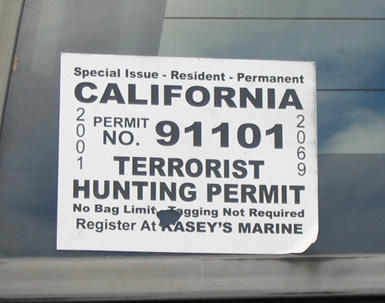 Here's a California version
Here's a California versionA Muslim man has been beaten to death outside a corner shop by a gang of youths who shouted anti-Islamic abuse at him, the Guardian has learned.
Kamal Raza Butt, 48, from Pakistan, was visiting Britain to see friends and family. On Sunday afternoon he went to a shop in Nottingham to buy cigarettes and was first called "Taliban" by the youths and then set upon.
Police authorities want to insist the incident had nothing to do with the London bombing. However Butt is demonstrably dead and no one is likely to believe them. Fear and hatred feed themselves.
More on that theme from Nosemonkey at Europhobia, who reports on the role of the racist and anti-immigrant British National Party in the West Yorkshire area where apparently the London suicide bombers grew up:
Events in distant lands may arouse anger. Religious invective may fuel feelings of self-righteousness. But most terrorists normally have some more personal reasons for their actions. There is usually some rationality behind their irrationality. They can usually, in their perverse way, justify their actions to themselves. It takes more than the promise of a few virgins and eternal life in Heaven to provoke someone to kill themselves and others - if not, everyone would be blowing themselves up all the time.
These terrorists could not have been bred in London. Accusations of our capital, which has shown its multicultural unity better than ever in the last few days, being "Londonistan" are blatantly silly, though have - as always - some truth to them. As the cliche goes, there's no smoke without fire. There ARE a lot of radical Muslims in London. . . .But it is this very tolerance which makes London-born terrorists unlikely. They can give vent to their anger and hatred freely. The very civil liberties which the government is trying to stifle in the name of protecting us - the right to free association and free speech - give an outlet to the rage of a disaffected Muslim youth. . . .
West Yorkshire, on the other hand, has been the site of even more stirring of hatred between communities. Hatred stirred by one of the least British groups in the entire country - the BNP. It was in West Yorkshire that BNP leader Nick Griffin stood for election just two months ago. His high-profile campaign, played just the right side of the race-hate laws, played much on fears of Muslims. . . . It was in the same region that race riots occurred a couple of years ago, something the BNP were keen to capitalise on as an indication of the volatility and danger inherent in Muslim youth, even while knowing that they had done much to fire them up.
If you were a young Muslim, British born, being told by a party that professes to be the party of Britain, of the nation, that you were not and never could be British, how would you feel? Would you feel included in society? Would you feel any love for your fellow countrymen? Would you even consider them your fellow countrymen?
It would take an extended campaign of lies and distortions to convince me that Britain is anything other than Great, even while I can see its flaws. This is precisely what the Muslim population of West Yorkshire have been subjected to by the BNP for the last decade.
I'm certainly unqualified to say whether what NM asserts here is true, but as a veteran of the Prop. 187 attack on immigrant human rights here in California and an observer of anti-immigrant panics in the US, it sure seems likely to me that he is on to something.
Arnold Zeros Labor Center
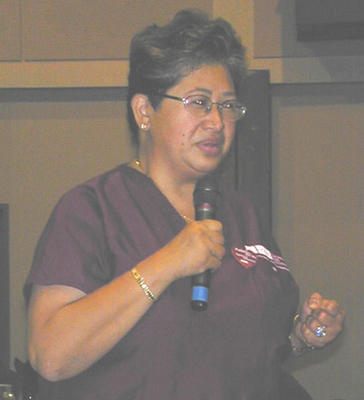
Nurse speaking out against Arnold
According to the San Francisco Chronicle, Gov. Arnold congratulated himself on his bipartisanship in signing California's budget yesterday; no mention of his crashing poll approval numbers which certainly encouraged him to make partial peace with the Democratic legislature.
No mention either that he had used his line item veto power to eliminate funding for two University of California labor research centers.
The $3.8 million cut will eliminate about 70 percent of the centers' funding, said Katie Quan, chair of the UC Berkeley Center for Labor Research and Education. There is also a branch at UCLA.
The centers, strongly supported by Democrats, hold workshops on how to increase union membership, get more at the bargaining table and fight globalization. They sponsor research on a range of workplace topics, from sex discrimination and health care to the role of unions in the economy.
The Labor Center is the source of recent reports on the costs of Wal-Mart's low wage jobs to local jurisdictions and on the trend projecting showing that job-based health care coverage will exist for only fifty percent of workers by 2010. And it doesn't just do research; it also provides mentoring and training for union leaders and members, community organizations, and UC students -- something a large university should do as a major provider of education to the WHOLE community. They have a specific focus on the "new" workforce--people of color, immigrants, and women. All of this is not being provided elsewhere in the California education system.
The rightwing Claremont Institute is crowing:
In a letter to supporters, the Center's director and Board write: "Discussions with legislative leadership are on-going. We will also continue to press our case that this work deserves full support from the University's other resources, which have grown considerably this year." The Labor Center was the only University item subjected to the line item veto this year!Governor Vetoes "Union U" Funding. . . They're not Ward Churchill but a lot more effective in promoting the programs of the left. If we took a closer look at public higher education in California, many more dubious programs would come to light, and we haven't even begun to talk about the anthropology departments.
UPDATE: On July 14, the Governator announced that he was going to press the University of California to fully fund the Labor Center. See here. Huh? He cut their funding by mistake?
Monday, July 11, 2005
Stale protest tactics

On Friday a tiny anarchist protest march passed by the street where I live several times and ended nearby with a cop bleeding from the head and 5 arrests, several of those on felony charges. The San Francisco Chronicle reported:
The San Francisco protest was billed as the "West Coast Anti-Capitalist Convergence and March against the G-8." Protesters broke windows and glass doors at two Wells Fargo Bank locations, a Kentucky Fried Chicken restaurant and a shoe store. Red anarchy signs were spray-painted on sidewalks and windows.
Police cordoned off the area where the injured officer had been swarmed and hit on the head by protesters after a mattress was thrown under his cop car. (This according to press accounts; I didn't see any of this part of the evenings' festivities.) We got to the police's yellow tape barricade not long after cops arrived in force to the call of "Officer down." and an ambulance pulled up. A few anarchists gathered across the street, stilled pumped up enough to yell some challenges at the cops, but the action was winding down.
My response to this, events that would be novel most places but were pretty commonplace in San Francisco, surprised me a little -- mostly the scene just made me feel tired. Am I turning into an old fogy?
Sure, a little. I'd noticed signs for the G-8 protest earlier in the day and thought, "no, I don't want any of that. Some bunch will need to prove their 'revolutionary' cred by breaking stuff and fighting cops. It will all mean nothing except to the protesters." And so it came to be, except that the legal charges are a lot heavier than usual and a police officer may have sustained a real, serious injury. I find it hard to imagine what busting up stuff in the San Francisco Mission District will do to impede the ravages of global capital. Almost certainly the protest will only mean that next time anarchists march, the SFPD will be out for their blood.
I've written on this blog about times in my life when rioting seemed a perfectly appropriate response to desecration. I still believe there are such times. But I believe little events like the other nights' demonstrate the decay of what once were viable tactics that have now become ritualized and counterproductive. Resistance to globalization showed its muscle in Seattle in 1999 -- and sadly, in an ever more atrophied form, activists have been trying to replicate that success of direction action ever since. But come on folks: Seattle had a politically understandable target, the WTO meetings; months of painstaking education and preparation brought the opposition to the actions better organized than the forces of the state; and thousands of activists were ready to take to the streets. It was a great model, but nothing, including the recent Edinburgh protests, has come close to equaling it. For one thing, the police have evolved better tactics that do not win demonstrators public sympathy.
Massed, anarchist flavored, direct action tactics are not unique in becoming stale models of protest. During the 1980s, mass non-violent blockades of nuclear facilities devolved into highly choreographed, pre-negotiated "non-violent" charades in which protesters assumed little risk and the police negated the moral force of the protest. In the mid-1960s, student strikes at US universities were unheard of, attention-demanding anomalies; by the end of the decade they were old news and lost their power.
What is likely to work in the future? I'm not imaginative enough to know, but I can throw down some simple thoughts that might help:
- The form of the protest should amplify the reason for the protest -- or at least not obscure the protest's message. If people who see you don't know why you are there, your protest is counterproductive. If you can't convey why you are there through the theater of the action, at least provide a flyer that explains your motives.
- The location of the protest should be relevant to the reason for the protest. In specific, just because the police will often allow vigorous protest in poor neighborhoods, there is no reason that such neighborhoods should have to serve as venues for outsiders to act out. On the other hand, affluent neighborhoods might find a visit novel.
- Fighting the police is for losers. Sure, cops represent the state, but mostly they are just people who got jobs they thought were about doing good. So they are often deluded -- but the police officers in front of you are not the problem. The problem is systemic and you need to show the sophistication to use your actions to carry that message.
Sunday, July 10, 2005
Two whys and a when

Cain and Abel; Bruderhof graphic
After the 9/11 attacks, a bewildered relative, a New York resident, asked "is it because of our arrogance?" I thought, yes -- and even more importantly, she was asking the right question, "why?"
Some writers from London today are again asking the right question -- "why?" -- and drawing their prescriptions for preventing additional atrocities from the answers. Tariq Ali, the Lahore-born, London-based British journalist and author proposes what in US terms is unthinkable:
The solution . . . is political, not military. The British ruling elite understood this perfectly well in the case of Ireland. Security measures, anti-terror laws rushed through parliament, identity cards, a curtailment of civil liberties, will not solve the problem. If anything, they will push young Muslims in the direction of mindless violence.
The real solution lies in immediately ending the occupation of Iraq, Afghanistan and Palestine. Just because these three wars are reported sporadically and mean little to the everyday lives of most Europeans does not mean the anger and bitterness they arouse in the Muslim world and its diaspora is insignificant. As long as western politicians wage their wars and their colleagues in the Muslim world watch in silence, young people will be attracted to the groups who carry out random acts of revenge.
David Clark, a Labour Party politician who now sits in the House of Lords as a life peer, similarly argues:
An effective strategy can be developed, but it means turning our attention away from the terrorists and on to the conditions that allow them to recruit and operate. No sustained insurgency can exist in a vacuum. At a minimum, it requires communities where the environment is permissive enough for insurgents to blend in and organise without fear of betrayal. This does not mean that most members of those communities approve of what they are doing. It is enough that there should be a degree of alienation sufficient to create a presumption against cooperating with the authorities. We saw this in Northern Ireland.
From this point of view, it must be said that everything that has followed the fall of Kabul has been ruinous to the task of winning over moderate Muslim opinion and isolating the terrorists within their own communities. In Iraq we allowed America to rip up the rule book of counter-insurgency with a military adventure that was dishonestly conceived and incompetently executed. Tens of thousands of innocent Iraqis have been killed by US troops uninterested in distinguishing between combatant and noncombatant, or even counting the dead.
. . .
The political dimensions of this problem mean that there can be no hope of defeating terrorism until we are ready to take legitimate Arab grievances seriously. We must start by acknowledging that their long history of engagement with the west is one that has left many Arabs feeling humiliated and used. . . . We cannot seriously claim to care for the rights of Arabs living in Iraq when it is obvious that we care so little for Arabs living in Palestine. The Palestinians need a viable state, but all the indications suggest that the Bush administration is preparing to bounce the Palestinians into accepting a truncated entity that will lack the basic characteristics of either viability or statehood. That must not be allowed to succeed.
At its inception post-9/11, the war on terror was shaped by the fact that it was American blood that had been shed. This gave President Bush the moral authority to tell the world "you're either with us or against us". Having stood with America, and paid a terrible price for doing so, it is now time to turn that demand back on Bush. . . . If Tony Blair cannot bring himself to say this, he owes it to his country to make way for someone who can.
Terrible events call for strong remedies as these two attest.
Meanwhile, half a world away, the Pakistani nuclear scientist Pervez Hoodbhoy, asks a more terrible question: When? Hoodbhoy reminds readers of an oped in the Los Angeles Times that the idea of an Islamic nuke is not some novel fantasy of jihadists, but has been a dream shared by rulers of Islamic nations that feel humiliated by Israel and the US at least since the 1970s.
Addressing posterity from his death cell in a Rawalpindi jail, where he would be hanged two years later, former Prime Minister Zulfikar Ali Bhutto, the architect of Pakistan's nuclear program, wrote in 1977: "We know that Israel and South Africa have full nuclear capability. The Christian, Jewish and Hindu civilizations have this capability. The communist powers also possess it. Only the Islamic civilization was without it, but that position was about to change."
Addressing an Islamic conference in Tehran in 1992, the Iranian vice president, Sayed Ayatollah Mohajerani, said, "Since Israel continues to possess nuclear weapons, we, the Muslims, must cooperate to produce an atomic bomb, regardless of U.N. efforts to prevent proliferation."
In the celebrations following Pakistan's 1998 nuclear tests, the decades-old religious party Jamaat-e-Islami paraded bomb and missile replicas through the streets of Pakistani cities. It saw in the bomb a sure sign of a reversal of fortunes and a panacea for the ills that have plagued Muslims since the end of the Golden Age of Islam. In 2000, I captured on video the statements of leaders of jihadist, right-wing political parties in Pakistan who also demanded a bomb for Islam.
. . .
Today, the United States lives in fear of the bomb it created, because the decision to use it has already been made. Pious men with beards will decide when and where on U.S. soil atomic weapons are to be used. Shadowy groups, propelled by fanatical hatreds, scour the globe for materials. They are not in a hurry. Time is on their side. They are doubtless confident they will one day breach Fortress America.
Hoodbhoy urges control of nuclear materials, especially the arsenal littered about the former Soviet Union and he certainly is right. But if we in the US want to avert the when question being answered, we better attend to the answers to the whys.
Friday, July 08, 2005
Globalization at work?
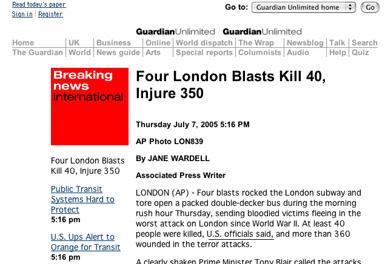
Yesterday morning, like others in my part of the world, I woke to the news of the London terrorist bombings. So I rushed to my favorite British internet newspaper -- and found what is captured in the screen shot above. (Underlining added.)
Was this a localized version for my domain server -- or were "U.S. officials" really the Guardian's source of casualty estimates hours after the blasts. Just wondering?
The Morning Retch: racist paranoid alert

Some twit named Peter Bergen of the "New America Foundation" makes this assertion in this morning's New York Times oped columns:
Here's the problem for the United States: Under our Visa Waiver Program, residents of Londonistan who hold a valid British passport can board a plane for the United States without an interview by an American consular official.
This program also applies to more than a score of other European countries, like France, Germany, the Netherlands and Spain, that meet the criteria for visa-free travel to the United States. Unfortunately, while these countries may enjoy a low visa refusal rate, grant reciprocal visa-free travel to Americans and issue machine-readable passports - all criteria for inclusion in the waiver program - many of them have also had a hard time integrating their growing Muslim populations.
. . .
As declining populations in Europe are replaced in part by rising Muslim emigration from the Middle East, North Africa and South Asia, economic resentment and sectarian strife seem likely to grow. Tinkering with visa regulations might help, but it is unlikely to change the reality that Islamic militant groups in Britain, as in several other major European countries, represent a growing threat to the United States that will continue for many years to come.
Evidently Europeans who are not white Christians can't be real Europeans.
Contrast Bergen with what Ken Livingstone, the Mayor of London, had to say about yesterday's attack:
This was not a terrorist attack against the mighty and the powerful. It was not aimed at Presidents or Prime Ministers. It was aimed at ordinary, working-class Londoners, black and white, Muslim and Christian, Hindu and Jew, young and old. It was an indiscriminate attempt to slaughter, irrespective of any considerations for age, for class, for religion, or whatever.
That isn’t an ideology, it isn’t even a perverted faith - it is just an indiscriminate attempt at mass murder and we know what the objective is. They seek to divide Londoners. They seek to turn Londoners against each other. I said yesterday to the International Olympic Committee, that the city of London is the greatest in the world, because everybody lives side by side in harmony. Londoners will not be divided by this cowardly attack. They will stand together in solidarity alongside those who have been injured and those who have been bereaved and that is why I’m proud to be the mayor of that city.
Until people in the US can find some of that spirit, we're lost.
Thursday, July 07, 2005
Summer fiction reading

One of the odd realities of trekking is that it allows quite a lot of time for reading, if you are not too tired and are willing to risk running down the batteries on your head lamp. Consequently in three weeks I read more fiction than I expect to touch for another year. Here's the run down on my summer reading.
One for the Money by Janet Evanovich. Apparently this was a run away bestseller a few years ago. If you are lucky enough NOT to have read it, all I can say is, don't. Detective Stephanie Plum is a tedious looser.
Gone Fishin' by Walter Mosley. This is a prequel to Mosley's Easy Rawlins mysteries, set in pre-World War II rural Texas. It is a slight effort, but grippingly descriptive of aspects of African American life that are certainly gone today -- if they ever existed. Recommended. Now I better get around to reading Mosley's main dish, the mysteries set in Los Angeles.
The Kite Runner by Khaled Hosseini, an epic of Afghanistan and a father and sons, the country and the men torn apart by invaders, occupiers and their own weaknesses. This is hugely ambitious and not entirely successful but absolutely recommended. I particularly appreciated the vignettes of the Afghan refugee community in Fremont, California. If Hosseini writes another novel, I suspect it will be tighter and even more compelling.
The No. 1 Ladies' Detective Agency by Alexander McCall Smith. What a pleasure! A novel about an African country, Botswana, that doesn't make its setting seem like a basket case and which isn't some angst ridden story of horror. Yes, yes, yes!
The Morning Retch: lock 'em up; make them pay

The LA Times [reg. required]reports a new brilliant new scheme to make our bulging lock-ups pay for themselves.
I'm so happy to be living in a regime of private opulence and public squalor. Better throw away the keys on those inmates!Los Angeles County jails have started charging sick inmates for visits to nurses, a practice that sheriff's officials estimated would reap as much as $2 million a year.
Prisoners — who generally face far worse medical problems than the rest of the population — will be billed $3 for each visit that does not result in a referral to a doctor, sheriff's officials said Wednesday.
. . .
"If we can discourage anyone from going to the doctor if they don't need to, then that's what we're going to do," said Klugman, who heads the department's Correctional Services Division. "We have a limited number of staff, and 6,000 inmates under a doctor's care at any one time."
. . .
California law allows sheriffs to charge inmates up to $3 for medical visits as long as no one is denied medical care due to a lack of funds. Inmates cannot be billed for follow-up visits with doctors or for treatment of a life-threatening problem.
Wednesday, July 06, 2005
SF Mime Troupe does its summer thing
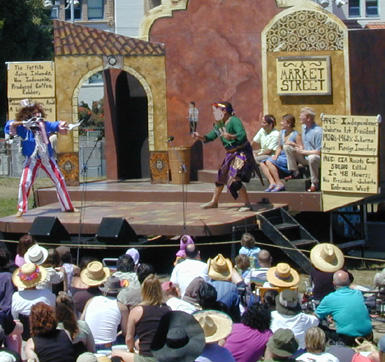
Watching the new free summer show over the Fourth of July weekend in Dolores Park is a tradition here, as is coping with swirling cold winds and fog. "Coldest winter I ever spent was a summer in San Francisco" [M. Twain] and all that.
Actually the Mime Troupe had good if cool weather last weekend for its new offering, Doing Good. The play, based on John Perkins best-selling Confessions of an Economic Hit Man, is an epic tour of US exploitation of developing countries from 1968 to 2005, very timely in light of the G-8 summit.
Unhappily the play is earnest and didactic to a fault; happily it is energetic and catches the mood of most of its viewers, reminding us to get off our duffs and do something if we want to feel good about ourselves in the future.
Catch a performance; it is an afternoon well spent. Schedule here.
The Morning Retch: in democracies the people rule edition*

How's this for democracy in action from today's New York Times?
- City Groups Get Bloomberg Gift of $20 Million. Nice way to promote your run for office if you can do it. Mayor Bloomberg faces the voters this fall. Of course the Carnegie Foundation that doles out the money says the donor doesn't influence who gets it; why Foundation president Vartan Gregorian hasn't spoken to the Mayor in four years. Yeah, and Gregorian got to be foundaton president without knowing how to massag big donors.
- Then there's an editorial: Africa in the Balance Aren't you relieved to know that "eight men are about to decide the future of hundreds of millions of people in sub-Saharan Africa."
A couple of days ago weren't we celebrating the once radical notion that governments "derive their just powers from the consent of the governed"? Oh for a little of that old fashioned radicalism.
*According, for example, to the Wikipedia. I don't just make this stuff up.
Tuesday, July 05, 2005
Trekking
"Trekking" seems to be a cultural form developed in the 19th century British empire. The Wikipedia associates it with mountainous regions of Nepal and India, but clearly it has spread worldwide. A trek involves local guides and a swarm of cooks, campsite workers, animal handlers and/or human porters who make it relatively comfortable for tourists to explore remote areas and heights they'd find difficult to reach on their own. For many tourists, trekking is easy adventure. All you have to do is keep yourself moving; the trekking company and its hired leaders will supply meals, tents and sometimes gear. In any case, somebody else will carry what you need.
A day of trekking will probably run something like this, from the tourist perspective:
6:30 am: wake-up in your tent to an offer of tea (those Brit origins here) or coffee and a bowl of hot water to wash in.
7:15 am: pack your sleeping bag and personal gear up for the porters. Tent crewmen will take down your tent, while you have breakfast in the mess tent.
8:15 am: start walking, climbing, whatever you are doing that day.
12 noon: porters have passed you on the trail with gear and tents; cooking crew has rushed ahead, and now you arrive at the newly erected mess tent for lunch.
1:00 pm: Walk some more.
4:00 pm: reach fully set up camp; find your personal gear in the pile and spread it out in your tent.
4:30 pm: Tea (more Brit origins here -- trekking leaders like to keep you full of carbs for energy and liquids to stay hydrated at altitude.)
5:00 pm: free time -- perhaps a little nap?
6:30 pm: dinner in the mess tent
7:30 pm: it is dark; perhaps it is time to go to sleep?
Repeat in the morning. Obviously, not a bad life if you can get it.
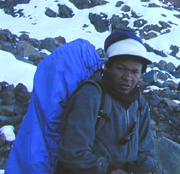

Guide Fredrick Chikima on Kilimanjaro; Guide Javier Bello in the Peruvian Andes
Good trekking guides are solid citizens with standing in their profession. (Of course there are bad, fly-by-night trekking companies and guides, but I've been lucky enough not to meet them.) The job requires long experience and some charisma; they not only have to jolly the tourists along, they also have to manage assistant guides, camp workers and porters, all of whom are likely to be casual contractors.
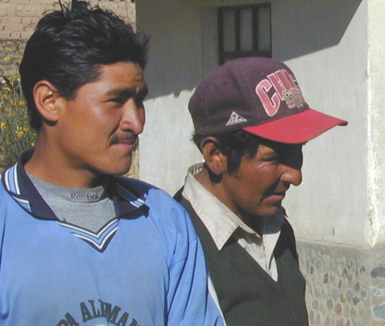
Peruvian crew men
Those jobs, lower in the strict trekking hierarchy, can be pretty good employment in poor societies. The combination of wages and tips can be a good income for rural men, perhaps supplementing farming in the off-season. But historically, porters have often been drawn from minority or undeveloped rural communities and exploited by both crew chiefs and the trekking companies. Inexperienced porters often lack mountain-ready clothing and equipment. A particularly pernicious practice is "paying off" a porter who develops altitude sickness and can't work; this can be a death sentence if the porter cannot find his way to lower altitude quickly.
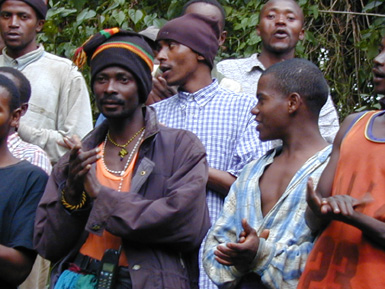
Tanzanian porters
Fortunately in the main trekking countries, Nepal, Tanzania and Peru, porters have organized associations or unions to keep wages up and gain some control over working conditions. The International Porter Protection Group (IPPG) tracks these efforts and provides technical assistance. They provide a list of questions to ask any company you deal with before you sign up for a trek:
1. Does the company you intend to trek with endorse the IPPG's guidelines on porter safety: are adequate clothing and shelter, insurance and provision for evacuation of porters provided?
2. What is their policy on equipment and health care for porters?
3. What do they do to ensure the trekking staff is properly trained to look after porters' welfare?
4. What is their policy on training and monitoring porter care by its ground operator in the country you will visit?
5. Do they ask about treatment of porters in their post trek questionnaire to clients?
To these questions, I can add a few others :
1. Does the company have a commitment to the country you will visit, for example employing permanent staff who are citizens there?
2. Does the company seem in touch with and respectful of the culture(s) of the place you hope to visit, for example promising to educate the visitor about it?
3. Does the company have policies that help preserve the environment from the damage that intensive tourism can cause: overuse, excess waste, pollution?
The two trekking companies I've taken trips with have met these criteria admirably: Thomson Safaris in Tanzania and World Expeditions, an Australian company with exceptionally good relations with responsible local touring companies in many areas of he world.
Monday, July 04, 2005
Shivering for Life


To celebrate our summer holiday, we vicariously visited Antarctica this afternoon via The March of the Penguins, a critterpic narrated by Morgan Freeman. Though the scenery was gorgeous and the tale of the penguin life cycle appealing, this needed an editor. It could have been at least half an hour shorter. And I did wonder at times whether I was seeing a disguised commercial for the Promise Keepers or Focus on the Family as Freeman extolled the faithful self-sacrifice of the penguin fathers. Still, worth seeing, and not a bad choice for what was probably my one movie in a theater this year.
UPDATE -- 9/13/05: Indeed, apparently conservatives also think this film promotes their picture of reality. See here.
Heroina
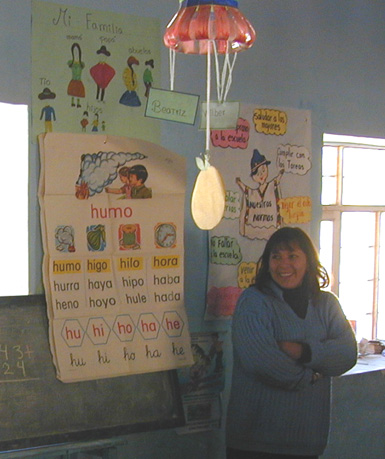
Her name is Katia. She teaches at the "Learning Place of the Heart," a one room school, high in an Andean valley on the sparsely populated edge of the national park that surrounds Machu Picchu. Her own children and husband live in the Peruvian city of Cusco; visiting her family requires a 4 to 6 hour walk out of the mountains, then long hours on a bus. Mostly she lives alone in a hut by the school. As a job necessity, she speaks both Quechua and Spanish. The schoolroom is full of pictures, mobiles, balloons -- she almost certainly provides them herself (with occasional help from tour groups like ours.) Some inner city schools in the US would be happy to have as many materials.
Her students are the children of the herding families in the park. I don't really know for certain, but I suspect they are pretty well off, by the standards of Andean alpaca and cattle herders who also grow a few potatoes. They have good-sized herds and large, close to pristine, areas on which to graze them. But their life style is not likely to persist into the next generation -- the park may decide they and their animals interfere with its overriding objective of capturing the tourist dollar. Already adult farmers must work off the land during fallow seasons to earn currency; grandparents and children remain behind in the remote valleys.
When the students grow up (at 13 or 14?) will they drift, out of necessity, to the margins of the cities, serving others as laborers and laundresses -- or will they have a chance to grab a piece of Peru's modern economy? The devotion of the Katias of the world will play a large role in their fate.
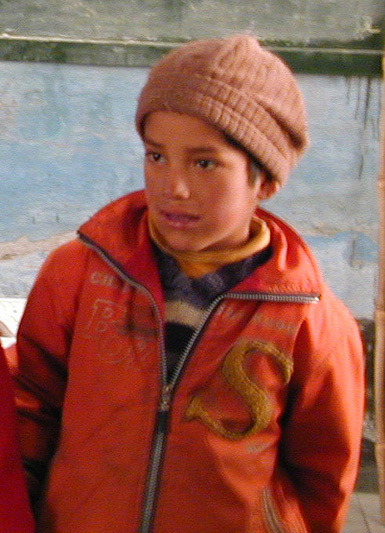
Student
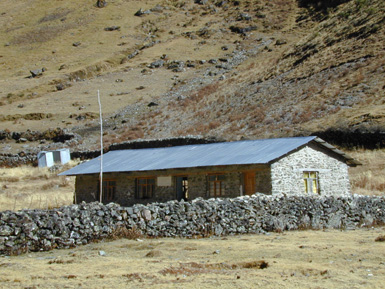
Learning Place of the Heart
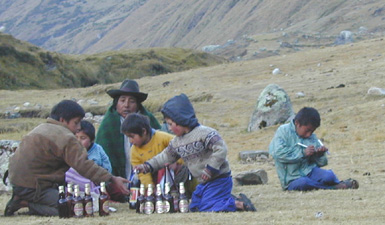
When the tourists come, residents set up the corner store.
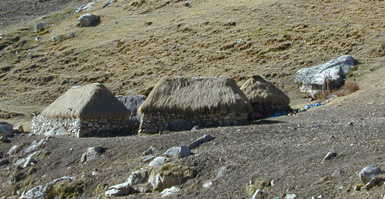
Herding families' homes
Saturday, July 02, 2005
The Morning Retch: Drug profiteering edition

The New York Times has a couple of disgusting bits of news this morning:
- In Mississippi, Soaring Costs Force Deep Medicaid Cuts -- Reporter Saila Dewan tells us:
Dewan did a good job finding human interest victims of this cutback -- and white ones at that. Why do these people have to suffer? To cut costs.Starting Friday, most Medicaid recipients in Mississippi will be limited to five prescription drugs at a time, with no process for appeal. The cap appears to be the most restrictive in the nation, but is just one of many measures being taken by states seeking to rein in soaring Medicaid costs.
It will hit hard for people like Erainna Johnson, 42, left legally blind by a stroke in 1997. She takes 19 medications - already more than the previous Medicaid limit of seven - relying on family members, her church and free samples from doctors to make up the difference. "Sometimes I just crack my pills in half, honestly," she said, sitting in the living room of her trailer here.
- Drug Lobby Got a Victory in Trade Pact Vote -- According to Stephanie Saul:
Nice. This provision amounts to incentive to withhold drugs from poor Central American countries as long as possible, so as to keep exclusive rights. Who cares if sick Central Americans die?The sidewalk between the drug industry's headquarters in Washington and the United States trade representative's office has been taking a pounding from the wingtips of industry lobbyists. The work of these drug industry courtiers, who represent what is arguably Washington's biggest and wealthiest lobby, appears to have succeeded in the Central American Free Trade Agreement. The agreement would extend the monopolies of drug makers and, critics say, lead to higher drug prices for the mostly impoverished people of the six Latin American countries it covers.
. . .The trade pact [includes] a requirement that gives brand-name manufacturers market exclusivity for five years after a drug is registered in the countries, even if the 20-year patent has expired.
What is wrong with a country and a system that treats human health as a commodity?